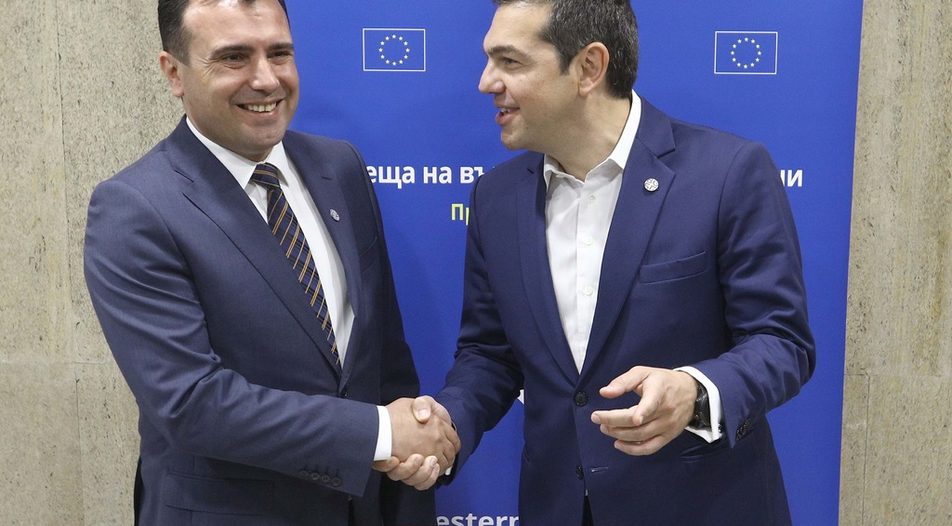It doesn't happen every day - the prime ministers of Greece and Macedonia, Alexis Tsipras and Zoran Zaev, got nominated for the Nobel Peace Prize in January 2019 by Members of the European Parliament. Their achievement: successfully negotiating and signing the Prespa Agreement in June 2018 that ended an almost three-decades-long dispute between the two countries over Macedonia's name. Finally, both countries agreed on the name North Macedonia, thus lifting Greece's long-standing blocking of Macedonia's bids for NATO and EU membership. As a result, Skopje signed an accession protocol with NATO as early as 6 February.
Bulgaria's reaction went unnoticed. But the announcement seems to have irked Bulgaria's Prime Minister Boyko Borissov who insists no name deal would have been possible without the Friendship Treaty between Bulgaria and Macedonia.
Bulgaria put an ostensible focus on the inclusion and future accession to the EU of the Western Balkans during its six-month presidency of the Council of the EU last year. Once that ordeal was over, Sofia somewhat disappeared from the Balkan diplomatic map.
Even though the name deal was shaped and signed during Bulgaria's presidency, Mr Borissov chose to remain silent as the West rushed to help his counterpart Zoran Zaev before the referendum on the agreement in Macedonia. The Macedonian government barely approved the new name of the country due to strong opposition at home. Mr Borissov's argument was that there was little Sofia could do to help the negotiations between Skopje and Athens. Other stakeholders in Bulgaria, meanwhile, relaunched the old dispute about whether a name change in Macedonia would hurt Bulgaria.
Two years ago, when Macedonia was still led by VMRO-DPMNE Prime Minister Nikola Gruevski, the idea of a Friendship Treaty between Bulgaria and Macedonia would have seemed pure fiction. Relations were sour as the use of history for political purposes and negative comments by nationalists on both sides of the border were adding up to the fundamental dispute around what Sofia sees as the Bulgarian origin of Slavs in Macedonia. Yet, with the advent of Mr Zaev's reformist-minded, pro-Western SDSM-led coalition, in August 2017 the treaty was signed, easing tensions and helping to iron out differences between the two neighbors.
Greece's northernmost geographical region is called Macedonia, but Bulgaria's own southwestern region is also located in the geographical area of the same name. In Skopje, Bulgarian President Rumen Radev said a year ago that names with "geographical qualifiers" would be unacceptable as they could imply a territorial claim. After the name deal was signed, opposition parties and some government coalition partners demanded that Bulgaria should seek ironclad guarantees (through an annex to the Friendship Treaty) to avoid distortion of history "as Greece had done".
| Accent |
|---|
| Bulgarian PM Boyko Borissov's change of heart regarding possible territorial claims by Skopje, plus the change of guard in Macedonia, helped to pave the country's way to Euroatlantic integration |
Interestingly, the domestic opposition to the deal echoed a stance the first government of Boyko Borissov used to have. In June 2012, it was Mr Borissov who suggested Skopje could claim the city of Blagoevgrad, in southwestern Bulgaria, if the new name went by "North Macedonia" (the foreign minister eerily played a similar tune hours before the Friendship Treaty was signed). Six years on, however, Mr Borissov underwent a change of heart and pushed hard for a deal between Skopje and Athens.
He hoped that it would have opened the way for Macedonia to be invited to start EU accession negotiations during Bulgaria's EU presidency, allowing Sofia to steal some of the spotlight. Bulgaria was the first country to back Skopje's bid to join NATO - just as it was the first nation to recognize the newly independent Macedonian republic in 1992. Formally opening the door to EU membership for Macedonia would have been another strong point for Sofia.
In all fairness, the Friendship Treaty did set an example. Bulgaria forgoing its demands towards Macedonia made things easier and put some pressure on Greece, as after the signing of the Friendship Treaty, Athens remained the only neighbor to have problems with Skopje. In addition, Bulgaria was also a useful "third country" to diplomats negotiating the deal between Skopje and Athens, as the Western Balkans focus provided them with opportunities to meet and talk.
Still, Sofia can gain from the Prespa deal. As the Greek hurdle fades, Bulgaria can anticipate an increased leverage on Macedonia's EU ambitions, although pundits in Skopje warn their country might not play along this time. More importantly, the deal invalidates fears of (hypothetical) territorial claims by adding assurances against them to Macedonia's constitution. Sofia could also learn a thing or two about using history as "a school and not a prison", as a former Greek foreign minister put it.
It doesn't happen every day - the prime ministers of Greece and Macedonia, Alexis Tsipras and Zoran Zaev, got nominated for the Nobel Peace Prize in January 2019 by Members of the European Parliament. Their achievement: successfully negotiating and signing the Prespa Agreement in June 2018 that ended an almost three-decades-long dispute between the two countries over Macedonia's name. Finally, both countries agreed on the name North Macedonia, thus lifting Greece's long-standing blocking of Macedonia's bids for NATO and EU membership. As a result, Skopje signed an accession protocol with NATO as early as 6 February.
Bulgaria's reaction went unnoticed. But the announcement seems to have irked Bulgaria's Prime Minister Boyko Borissov who insists no name deal would have been possible without the Friendship Treaty between Bulgaria and Macedonia.












